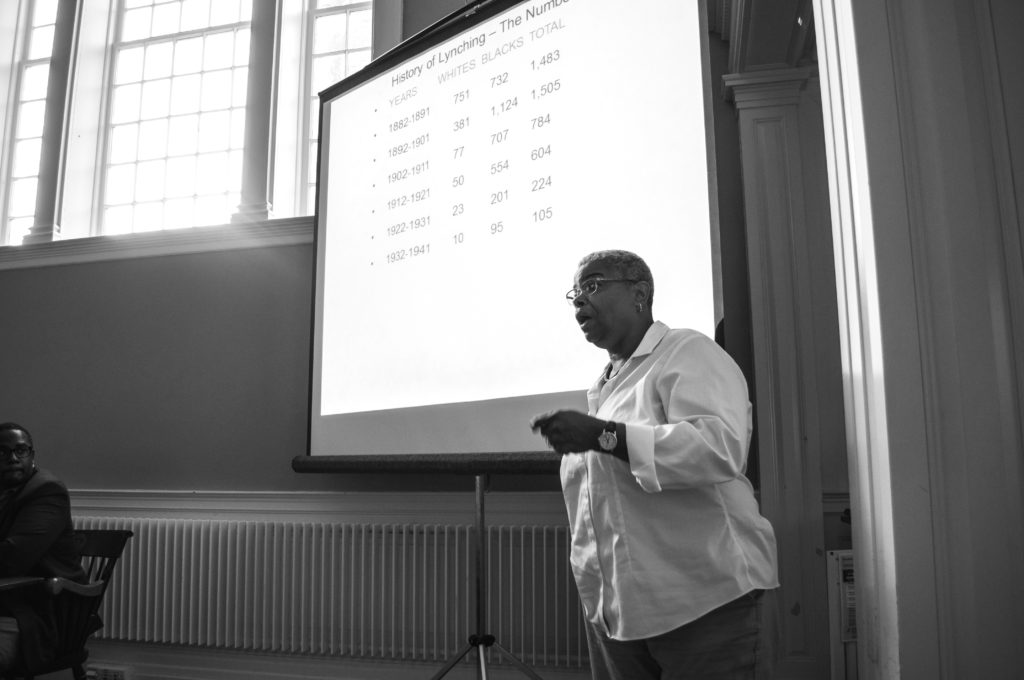“Stalwart Presence for a Generation at Williams College”: Remembering Leslie Brown
 It should go without saying, but I miss Leslie Brown. What she did for an entire generation of scholars can hardly be understated. And yet, I will attempt to capture her impact as best as I can.
It should go without saying, but I miss Leslie Brown. What she did for an entire generation of scholars can hardly be understated. And yet, I will attempt to capture her impact as best as I can.
I first encountered Leslie at Williams College in a course on slavery in the United States I took as a freshman. I was in the class for two reasons. First, as a young Black scholar I endeavored to take every Africana Studies class possible. Second, I wanted to take a class with a professor about whom so many had spoken so highly. I could not have anticipated that the woman who ran into class a few minutes late and out of breath (as was custom) would have such a profound impact on my own life and career path.
In that freshman class, I learned two things. First, as Leslie guided me through my first full-length research paper, I learned that research was difficult. Second, I learned that she had a gift for pushing students to find new truth on their own. That gift became even more apparent three years later when she served as my thesis adviser for a project that reconsidered the life and legacy of Arturo Schomburg.
In retrospect, I now see the flaws, blind spots, and mistakes of my work up to that point. Yet, in evaluating my work, Leslie never attacked or disparaged it. Instead, she cleverly offered strong suggestions that always led me in the right direction. She changed my thinking, my direction, and my writing in empowering ways. And she celebrated when students reached new destinations by showing genuine excitement and pride.

Almost two weeks ago, before I discovered her condition, I decided to read Leslie’s book Upbuilding Black Durham for the first time, a task that was long overdue. Three years after graduation, with different eyes, I now see more clearly than before the ways that she had subtly guided and shaped my thinking as an undergraduate student. But I could also see why I gravitated to her all those years ago. She approached her work, as she approached life, with a keen understanding of human complexity and the human condition, both present and historical. Without judgment, she acknowledged and analyzed the very human choices and qualities that people make, past and present. She accepted all the positives and negatives, and up and downs, as a part of life.
Even more important than how she shaped my work and thinking was the fact that Leslie supported and stood behind me in ways that not many can rival. I still remember the ways she advocated for my work; she pounded the table for me and my project more than once to get the recognition that she felt I deserved. And at times, I felt as if I did not deserve the support she granted. More than most, she made me believe, and know, that I had something to say and to teach others.
To know that someone so brilliant, warm, and wise believed in me was more than I could ever ask for. Many others will speak to the legacy and impact she leaves behind in the academic community. But as a former student, I felt Leslie’s impact far beyond the discipline. She touched many lives, whether it was in the classroom or mentoring members of the Black Student Union.
The most difficult part for me is to know that I still had so much more to learn from Leslie, that I still felt like I needed to lean more on her insight, and frankly her support, to get me through. In getting to the stage of a dissertation in a few years, I do not want simply to write that my work is “In Loving Memory of Leslie Brown,” because she deserves so much more than that, much more than I can give. But I hope someday to make her and her legacy proud. I know I am not the only person who shares those sentiments.
Copyright © AAIHS. May not be reprinted without permission.
Thank you for writing this moving tribute. It is inspiring and reminds me of the reasons we focused on teaching Black History, and motivating our students to high levels of expectations. Professor Brown is a model for us all, a model for the ages. Keep her memory alive, keep her commitment and actions constant in your work. Thank you again.
Keep on keeping on.
Thanks for this Don.
We will all carry small pieces of her with us that are filled with an infinite amount of love and subtle reminders that she will be watching over us from the other side.
Thank you for writing this tribute. The kind of truly supportive mentorship Professor Brown gave you is beautiful and deeply generous.